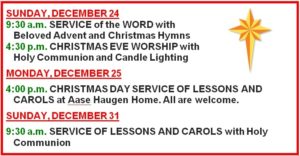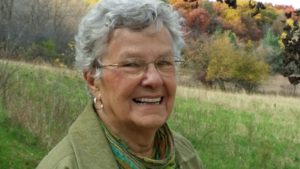 Monday, December 25
Monday, December 25
4:00 p.m. – Service of Lessons and Carols at Aase Haugen home
Thursday, December 28
NO Adult Bible Study
Sunday, December 31 – First Sunday of Christmas
8:45 a.m. – Choir/Band Rehearsal
9:30 a.m. – Worship with Holy Communion – No Broadcast
10:30 a.m. – Fellowship Hour





